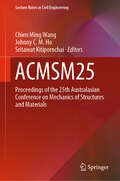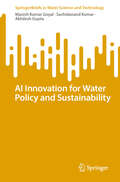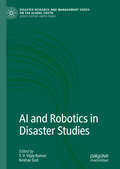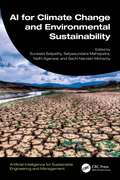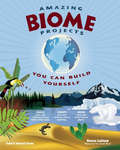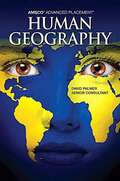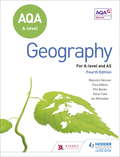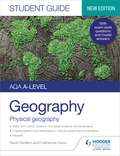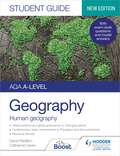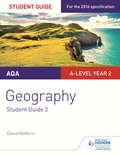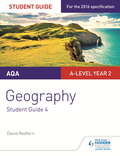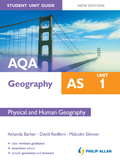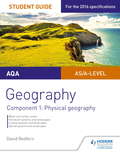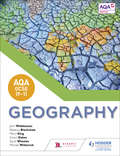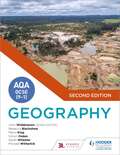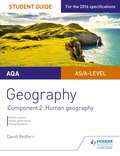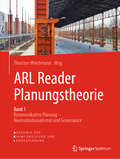- Table View
- List View
ACMSM25: Proceedings of the 25th Australasian Conference on Mechanics of Structures and Materials (Lecture Notes in Civil Engineering #37)
by Chien Ming Wang Johnny C. M. Ho Sritawat KitipornchaiThis book presents articles from The Australasian Conference on the Mechanics of Structures and Materials (ACMSM25 held in Brisbane, December 2018), celebrating the 50th anniversary of the conference. First held in Sydney in 1967, it is one of the longest running conferences of its kind, taking place every 2–3 years in Australia or New Zealand. Bringing together international experts and leaders to disseminate recent research findings in the fields of structural mechanics, civil engineering and materials, it offers a forum for participants from around the world to review, discuss and present the latest developments in the broad discipline of mechanics and materials in civil engineering.
ACT Test Prep Flash Cards: Earth Science Review (Exambusters ACT Workbook #10 of 13)
by Ace Inc.600 questions. Topics: Earth's Origin, Minerals, Rocks, Weathering, Wind and Glaciers, Oceans, Maps, Atmosphere, Astronomy. <P><P><i>Advisory: Bookshare has learned that this book offers only partial accessibility. We have kept it in the collection because it is useful for some of our members. Benetech is actively working on projects to improve accessibility issues such as these.</i><P><P>
AGEING SOCIETIES: A Multi-disciplinary Approach (A\hodder Arnold Publication)
by Sarah HarperDemographic ageing is a reality - within 25 years half the population of Western Europe will be over 50, one quarter over 65, and the Less Developed Countries will contain one billion elderly people. Ageing Societies examines the myths, challenges and opportunities behind these figures. Ageing Societies explores three areas:§ the growing necessity for extending economic activity into later life and the implications of societal ageing for the intergenerational contract and the provision of social security § the changes in modern families and the implications the changes have for the provision of support and care for the ageing population § the biggest demographic challenge of all: ageing in the Less Developed Countries where there is little or no infrastructure to provide long-term care or social security.Combining bio-demography, sociology, economics and development studies, Ageing Societies highlights the opportunities of an ageing population for a mature society. Age-integrated and flexible workforces, increased labour mobility, intergenerational integration, age equality and politically stable age-integrated societies are the potential benefits of a demography which will be with us for the majority of this century.
AI Innovation for Water Policy and Sustainability (SpringerBriefs in Water Science and Technology)
by Manish Kumar Goyal Akhilesh Gupta Sachidanand KumarIn the face of unprecedented challenges in managing water resources, the integration of artificial intelligence (AI) emerges as a revolutionary force, reshaping the landscape of water conservation, treatment, irrigation, policy formulation, watershed management, and the monitoring of groundwater and surface water. This book explores the transformative role of AI in the water domain, exploring cutting-edge applications and innovative solutions that promise to address pressing issues in sustainable water management. As we navigate the complexities of a changing climate, population growth, and urbanization, the chapters within this book offer insights into how AI technologies can enhance efficiency, optimize resource utilization, and provide data-driven strategies for ensuring the resilience and sustainability of our vital water ecosystems. From intelligent water treatment systems to precision agriculture and policy decision support, each chapter unfolds a narrative of AI-driven advancements, providing a comprehensive guide for researchers, practitioners, and policymakers navigating the intersection of artificial intelligence and water management.
AI and Robotics in Disaster Studies (Disaster Research and Management Series on the Global South)
by T. V. Vijay Kumar Keshav SudThis book promotes a meaningful and appropriate dialogue and cross-disciplinary partnerships on Artificial Intelligence (AI) in governance and disaster management. The frequency and the cost of losses and damages due to disasters are rising every year. From wildfires to tsunamis, drought to hurricanes, floods to landslides combined with chemical, nuclear and biological disasters of epidemic proportions has increased human vulnerability and ecosystem sustainability. Life is not as it used to be and governance to manage disasters cannot be a business as usual. The quantum and proportion of responsibilities with the emergency services has increased many times to strain them beyond their human capacities. Its time that the struggling disaster management services get supported and facilitated by new technology of combining Artificial Intelligence (AI) and Machine Learning (ML) with Data Analytics Technologies (DAT)to serve people and government in disaster management. AI and ML have advanced to a state where they could be utilized for many operations in disaster risk reduction. Even though many disasters cannot be prevented and a number of them are blind natural disasters yet through an appropriate application of AI and ML quick predictions, vulnerability identification and classification of relief and rescue operations could be achieved.
AI for Climate Change and Environmental Sustainability (Artificial Intelligence for Sustainable Engineering and Management)
by Suneeta Satpathy Sachi Nandan Mohanty Satyasundara Mahapatra Nidhi AgarwalThis book discusses the adverse effects of climatic changes on our planet. It examines AI-based tools and technologies and how they can assist in identifying energy emission reductions, CO2 removal, and support the development of greener transportation networks, monitoring deforestation, and forecasting extreme weather events.AI for Climate Change and Environmental Sustainability identifies and discusses in detail the importance of environmental sustainability based on accomplishment of the UN's 17 Sustainable Developmental Goals (SDGs). It presents the various AI-based possibilities for accelerating international efforts to safeguard the environment and conserve natural resources. The authors offer a comprehensive analysis of the emerging field of climate change in relation to Internet of Things, artificial intelligence, machine learning, and deep learning. The book discusses AI developments, applications, and best practices that will help us transition to a low-carbon future on both a regional and global scale. It provides case studies with analytical results pertinent to climate change and weather prediction and includes chapters with a research-oriented approach, which can encourage new developments in the field of sustainable climate and green environment.The book can be used as a primary textbook for graduate and postgraduate students in technology and science, as well as a reference for researchers, academics, and IT professionals working on climate change and sustainability initiatives.
AI in Material Science: Revolutionizing Construction in the Age of Industry 4.0
by Syed Saad Syed Ammad Kumeel RasheedThis book explores the transformative impact of artificial intelligence on material science and construction practices in the Industry 4.0 landscape. It enquires into AI history and applications, examining material optimization, smart materials, and AI in construction. Covering automation, robotics, and AI-assisted design, the book provides insights into ethical considerations and future trends. A modern reference for scholars and professionals, it bridges academia and practical applications in the dynamic intersection of AI and materials science.
AIR EMISSIONS From Animal Feeding Operations: Current Knowledge, Future Needs
by Ad Hoc Committee on Air Emissions from Animal Feeding Operations"Air Emissions from Animal Feeding Operation: Current Knowledge, Future Needs discusses the need for the U. S. Environmental Protection Agency to implement a new method for estimating the amount of ammonia, nitrous oxide, methane, and other pollutants emitted from livestock and poultry farms, and for determining how these emissions are dispersed in the atmosphere. The committee calls for the EPA and the U. S. Department of Agriculture to establish a joint council to coordinate and oversee short- and long-term research to estimate emissions from animal feeding operations accurately and to develop mitigation strategies. Their recommendation was for the joint council to focus its efforts first on those pollutants that pose the greatest risk to the environment and public health.
AMAZING BIOME PROJECTS
by Donna Latham Farah RizviAmazing Biome Projects You Can Build Yourself takes kids ages 9 and up on a circumnavigation of the globe to learn about Earth's terrestrial and aquatic biomes. Kid's will wander through forests, sizzle in deserts, shiver in the tundra, plunge beneath the seas to explore coral reefs, and slog through marshy waters. Along the way, kids will encounter flora and fauna adapted for survival in each unique climate zone. They'll learn about gnarly krumholz trees, bioluminescent sea creatures, camouflage, carnivorous plants, and blubbery marine critters. In each biome, people who use science in their jobs are highlighted, whether at the site of a disastrous oil spill or an oh-so-cool mastodon dig.
AMSCO Advanced Placement Human Geography
by David PalmerEquip your students to excel in the current AP Human Geography course and on the exam.
AP Human Geography Flashcards, Fifth Edition: Up-to-Date Review (Barron's AP)
by Peter S. Alagona Meredith Marsh Ph.D.Be prepared for exam day with Barron&’s. Trusted content from AP experts!Barron&’s AP Human Geography Flashcards includes 500 + up-to-date content review cards. Written by Experienced Educators Learn from Barron&’s--all content is written and reviewed by AP expertsBuild your understanding with review tailored to the most recent exam Be Confident on Exam DayStrengthen your knowledge with in-depth review covering all units on the AP Human Geography exam Find specific concepts quickly and easily with cards organized by topic Check out Barron&’s AP Human Geography Premium for even more review, full-length practice tests, and access to Barron&’s Online Learning Hub for a timed test option and automated scoring.
AQA A-level Geography Fourth Edition
by Ian Whittaker Paul Abbiss Helen FyfeExam Board: AQALevel: AS/A-levelSubject: GeographyFirst Teaching: September 2016First Exam: June 2018AQA approvedEncourage every student to develop in-depth knowledge and advanced geographical skills with this Student Book from the leading A-level Geography publisher*, fully updated for 2016 with detailed content coverage, fascinating case studies and assessment preparation materials.- Enables students of all abilities to increase, apply and revise their subject knowledge as they work through clear explanations of key terms and topics- Brings geographical theory to life by providing a rich source of up-to-date case studies for each physical and human topic- Builds the core, cartographic, graphical, statistical and ICT skills that students need to maximise their potential through a dedicated skills section tailored to AQA's 2016 specification- Helps students engage with challenging concepts, reflect on their learning and map their progress with pointer questions throughout and end-of-chapter review questions- Allows AS and A-level students to approach their exams with confidence by undertaking a variety of practice questions written by subject specialists with examining experience- Supports you in planning relevant and exciting fieldwork projects that meet the changed fieldwork and investigation requirements*Taken from Educational Publishers Council statistics
AQA A-level Geography Student Guide 1: Physical Geography
by David RedfernReinforce understanding throughout the course with clear topic summaries and sample questions and answers to help students target higher grades.Written by experienced teacher and subject experts David Redfern and Catherine Owen, this Student Guide is divided into two key sections - content guidance, and sample questions and answers.Content guidance will:- Develop understanding of key concepts and terminology in key physical geography topics water and carbon cycles, hot desert systems and landscapes, glacial systems and landscapes, and hazards. - Consolidate knowledge with 'knowledge check questions' at the end of each topic and answers in the back of the book.Sample questions and answers will:- Build understanding of the different question types, so that students can approach each question with confidence.- Enable students to target top grades in their exam paper with sample answers and commentary explaining exactly why marks have been awarded.
AQA A-level Geography Student Guide 1: Physical Geography
by David RedfernReinforce understanding throughout the course with clear topic summaries and sample questions and answers to help students target higher grades.Written by experienced teacher and subject experts David Redfern and Catherine Owen, this Student Guide is divided into two key sections - content guidance, and sample questions and answers.Content guidance will:- Develop understanding of key concepts and terminology in key physical geography topics water and carbon cycles, hot desert systems and landscapes, glacial systems and landscapes, and hazards. - Consolidate knowledge with 'knowledge check questions' at the end of each topic and answers in the back of the book.Sample questions and answers will:- Build understanding of the different question types, so that students can approach each question with confidence.- Enable students to target top grades in their exam paper with sample answers and commentary explaining exactly why marks have been awarded.
AQA A-level Geography Student Guide 2: Human Geography
by David RedfernReinforce understanding throughout the course with clear topic summaries and sample questions and answers to help students target higher grades. Written by experienced teacher and subject experts David Redfern and Catherine Owen, this Student Guide is divided into two key sections - content guidance, and sample questions and answers. Content guidance will: - Develop understanding of key concepts and terminology in key human geography topics: global systems and global governance, changing places, contemporary urban environments, population and the environment, resource security. - Consolidate knowledge with 'knowledge check questions' at the end of each topic and answers in the back of the book. Sample questions and answers will: - Build understanding of the different question types, so that students can approach each question with confidence. - Enable students to target top grades in their exam paper with sample answers and commentary explaining exactly why marks have been awarded.
AQA A-level Geography Student Guide 2: Human Geography
by David RedfernReinforce understanding throughout the course with clear topic summaries and sample questions and answers to help students target higher grades. Written by experienced teacher and subject experts David Redfern and Catherine Owen, this Student Guide is divided into two key sections - content guidance, and sample questions and answers. Content guidance will: - Develop understanding of key concepts and terminology in key human geography topics: global systems and global governance, changing places, contemporary urban environments, population and the environment, resource security. - Consolidate knowledge with 'knowledge check questions' at the end of each topic and answers in the back of the book. Sample questions and answers will: - Build understanding of the different question types, so that students can approach each question with confidence. - Enable students to target top grades in their exam paper with sample answers and commentary explaining exactly why marks have been awarded.
AQA A-level Geography Student Guide 3: Hazards; Population and the Environment
by David RedfernReinforce students' geographical understanding throughout their course; clear topic summaries with sample questions and answers help students improve their exam technique and achieve their best.Written by a teacher with extensive examining experience, this guide:- Helps students identify what they need to know with a concise summary of the topics examined at AS and A-level- Consolidates understanding through assessment tips and knowledge-check questions- Offers opportunities for students to improve their exam technique by consulting sample graded answers to exam-style questions- Develops independent learning and research skills- Provides the content students need to produce their own revision notes
AQA A-level Geography Student Guide 4: Geographical Skills and Fieldwork
by David RedfernReinforce students' geographical understanding throughout their course; clear topic summaries with sample questions and answers help students improve their exam technique and achieve their best.Written by a teacher with extensive examining experience, this guide:- Helps students identify what they need to know with a concise summary of the topics examined at AS and A-level- Consolidates understanding through assessment tips and knowledge-check questions- Offers opportunities for students to improve their exam technique by consulting sample graded answers to exam-style questions- Develops independent learning and research skills- Provides the content students need to produce their own revision notes
AQA AS Geography Student Unit Guide: Physical and Human Geography
by David Redfern Amanda Barker Malcolm SkinnerWritten by senior examiners, Amanda Barker, David Redfern and Malcolm Skinner, this AQA AS Geography Student Unit Guide is the essential study companion for Unit 1: Physical and Human Geography. This full-colour book includes all you need to know to prepare for your unit exam: clear guidance on the content of the unit, with topic summaries, knowledge check questions and a quick-reference index, examiner's advice throughout, so you will know what to expect in the exam and will be able to demonstrate the skills required and exam-style questions, with graded student responses, so you can see clearly what is required to get a better grade.
AQA AS/A-level Geography Student Guide: Physical Geography
by David RedfernReinforce students' geographical understanding throughout their course; clear topic summaries with sample questions and answers help students improve their exam technique and achieve their best.Written by a teacher with extensive examining experience, this guide:- Helps students identify what they need to know with a concise summary of the topics examined at AS and A-level- Consolidates understanding through assessment tips and knowledge-check questions- Offers opportunities for students to improve their exam technique by consulting sample graded answers to exam-style questions- Develops independent learning and research skills- Provides the content students need to produce their own revision notes
AQA GCSE (91) Geography
by John Widdowson Rebecca Blackshaw Meryl KingHelp your students develop enquiring minds as they learn the geographical knowledge and skills they need through the enquiries of the new OCR B specification which include and up-to-date case studies, a wide range of activities and exam-style questions developed to support and stretch students of all abilities.- Supports students of all abilities through differentiated activities including scaffolded questions and extension questions.- Highlights opportunities for fieldwork throughout the book, and includes guidance on carrying out fieldwork.- Develops students' geographical skills including activities and clear explanations of how to use mathematical and statistical skills.- Helps students gain confidence for the exam with a variety of exam-style practice questions at different levels, with tips on how to approach them.
AQA GCSE (9–1) Geography Second Edition
by Sarah Wheeler Simon Oakes Michael Witherick John Widdowson Rebecca Blackshaw Meryl KingExam board: AQALevel: GCSESubject: GeographyEquip your students for AQA GCSE (9-1) Geography with our fully revised second edition Student Book. Our expert author team, John Widdowson, Rebecca Blackshaw, Meryl King, Sarah Wheeler, Simon Oakes and Michael Witherick bring you revised case studies and examples, as well as a wealth of new practice questions to help your students apply their knowledge to succeed at GCSE.- Enables students to learn and practice geographical, mathematical and statistical skills through engaging activities specifically designed for the 2016 curriculum- Develops students' skills responding to a range of questions with topic-specific Question Practice in each section, supplemented by practical insight from skilled teachers with examining experience- Incorporates possible fieldwork enquiries throughout with expert advice on the fieldwork assessment from authors specialising in this key area- Reduces your research time using the up to date contemporary case studies featuring UK and international examples- Features new examples and fully up-to-date statistics and examples, equipping you to teach a thoroughly contemporary course
AQA GCSE (9–1) Geography Second Edition
by Sarah Wheeler Simon Oakes Michael Witherick John Widdowson Rebecca Blackshaw Meryl KingExam board: AQALevel: GCSESubject: GeographyEquip your students for AQA GCSE (9-1) Geography with our fully revised second edition Student Book. Our expert author team, John Widdowson, Rebecca Blackshaw, Meryl King, Sarah Wheeler, Simon Oakes and Michael Witherick bring you revised case studies and examples, as well as a wealth of new practice questions to help your students apply their knowledge to succeed at GCSE.- Enables students to learn and practice geographical, mathematical and statistical skills through engaging activities specifically designed for the 2016 curriculum- Develops students' skills responding to a range of questions with topic-specific Question Practice in each section, supplemented by practical insight from skilled teachers with examining experience- Incorporates possible fieldwork enquiries throughout with expert advice on the fieldwork assessment from authors specialising in this key area- Reduces your research time using the up to date contemporary case studies featuring UK and international examples- Features new examples and fully up-to-date statistics and examples, equipping you to teach a thoroughly contemporary course
AQA Geography Student Guide: Human Geography
by David RedfernReinforce students' geographical understanding throughout their course; clear topic summaries with sample questions and answers help students improve their exam technique and achieve their best.Written by a teacher with extensive examining experience, this guide:- Helps students identify what they need to know with a concise summary of the topics examined at AS and A-level- Consolidates understanding through assessment tips and knowledge-check questions- Offers opportunities for students to improve their exam technique by consulting sample graded answers to exam-style questions- Develops independent learning and research skills- Provides the content students need to produce their own revision notes
ARL Reader Planungstheorie Band 1: Kommunikative Planung - Neoinstitutionalismus und Governance
by Thorsten WiechmannBand 1 des ARL Readers Planungstheorie behandelt zwei der einflussreichsten planungstheoretischen Metaerzählungen des späten 20. Jahrhunderts: „Kommunikative Planung“ sowie „Neo-Institutionalismus und Governance“. Mit ihnen verbindet sich die erfolgreiche Überwindung einer technokratisch-rationalistischen Vorstellung von Planung. Kommunikation, Macht und Konflikt werden zu zentralen Kategorien der Auseinandersetzung mit der Planungsrealität.Der ARL Reader Planungstheorie leistet eine umfassende und doch pointierte Bestandsaufnahme des Diskussionsstandes. Als Sammelwerk präsentiert er Debatten bestimmende Originaltexte bekannter Autoren. Diese werden durch namhafte Planungswissenschaftler eingeordnet und kritisch diskutiert. Damit bietet der Band einen so bisher nie da gewesenen Überblick über die Grundlagen der aktuellen planungstheoretischen Debatten für Studierende der Raum- und Planungswissenschaften sowie fachlich interessierte Wissenschaftler und Praktiker.
